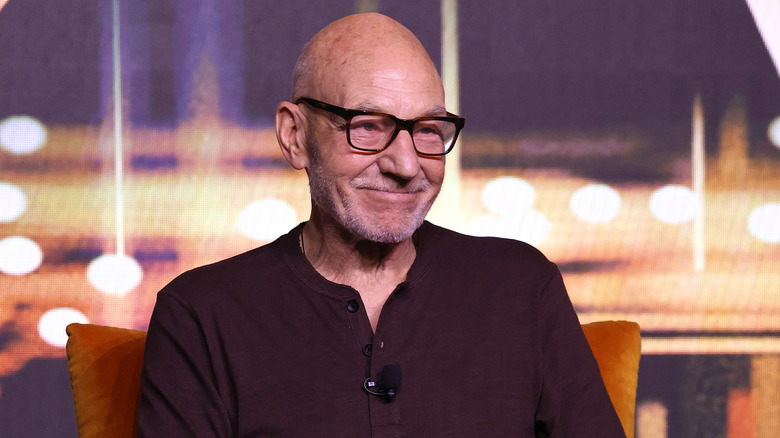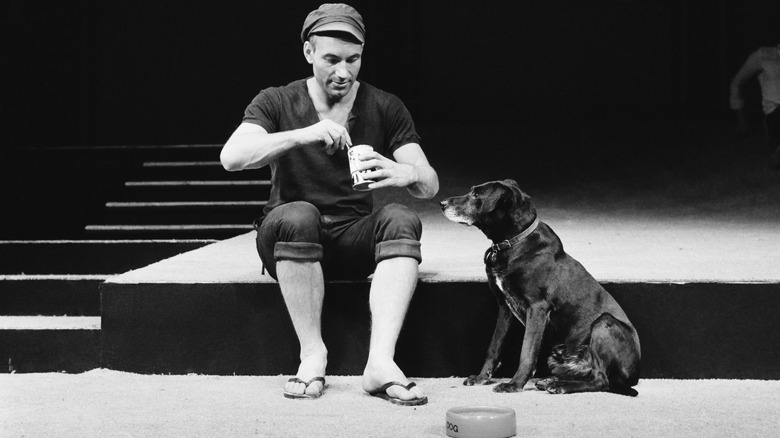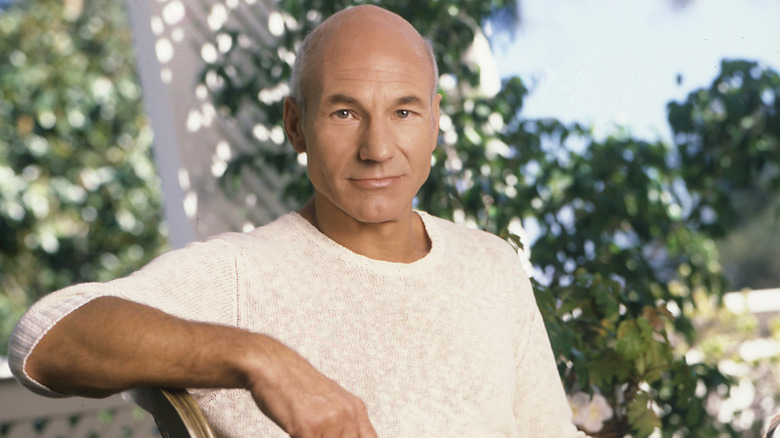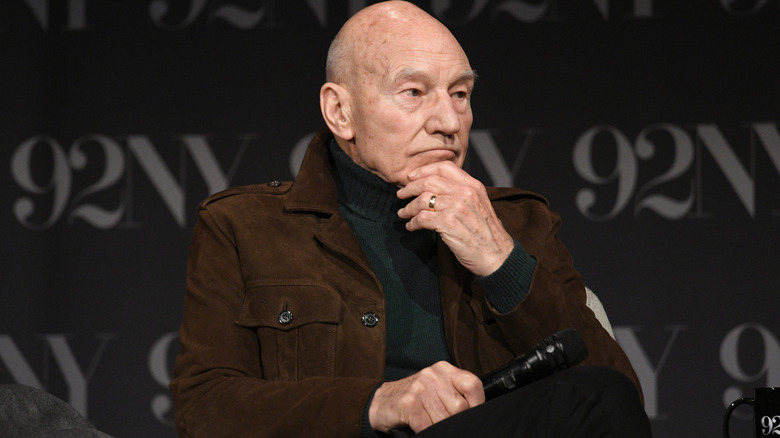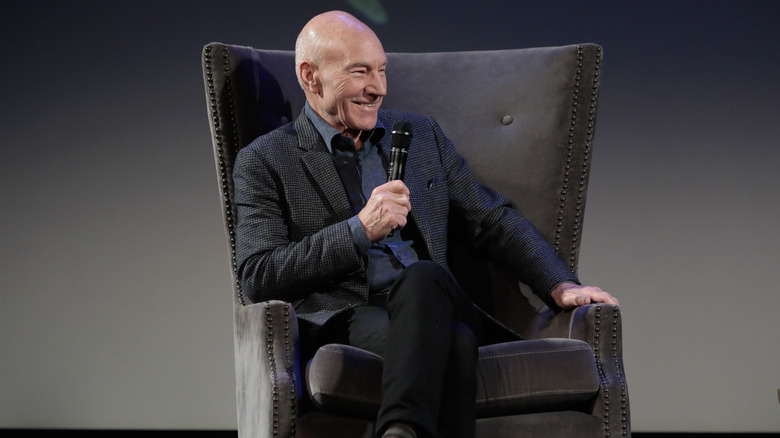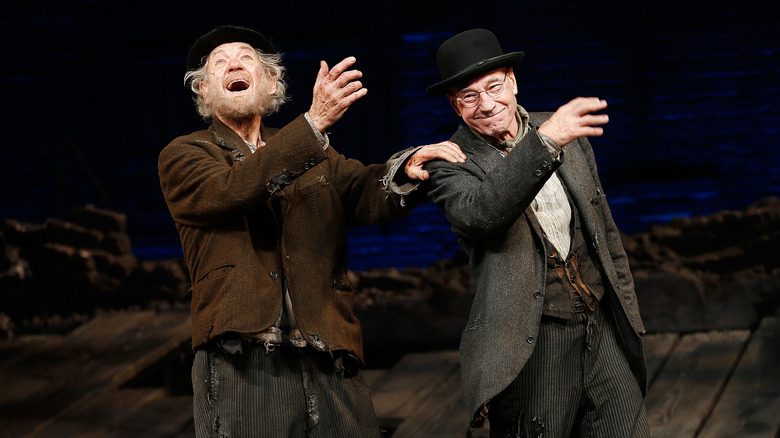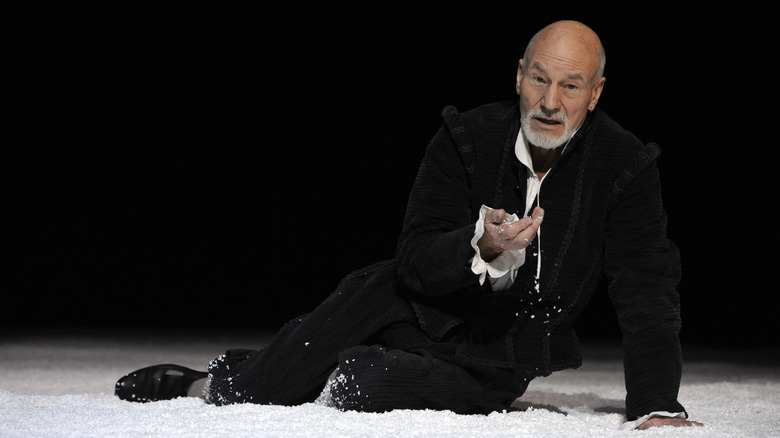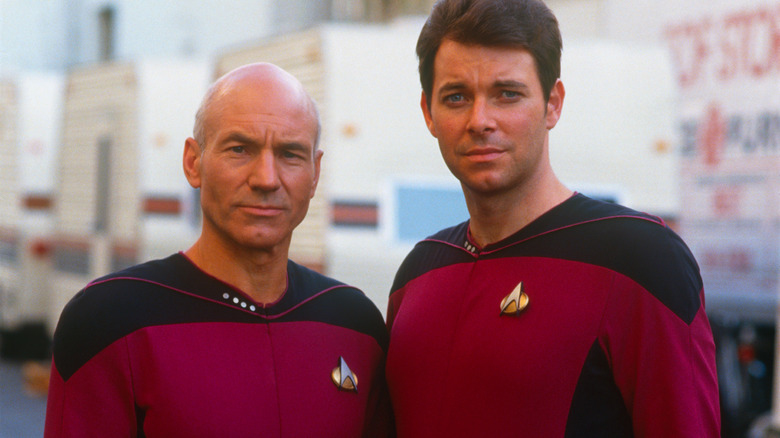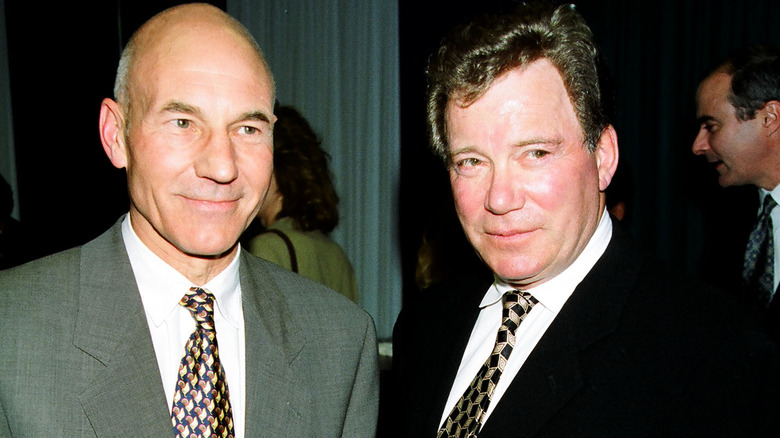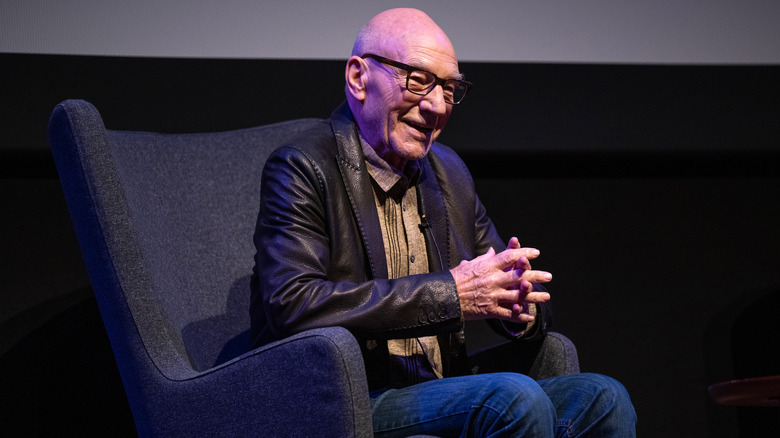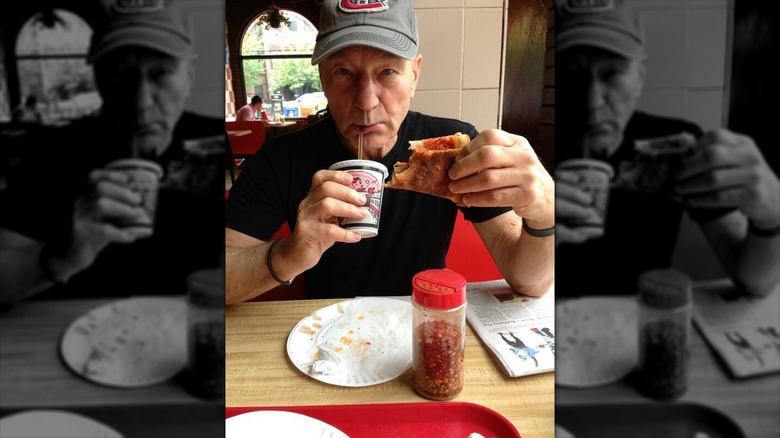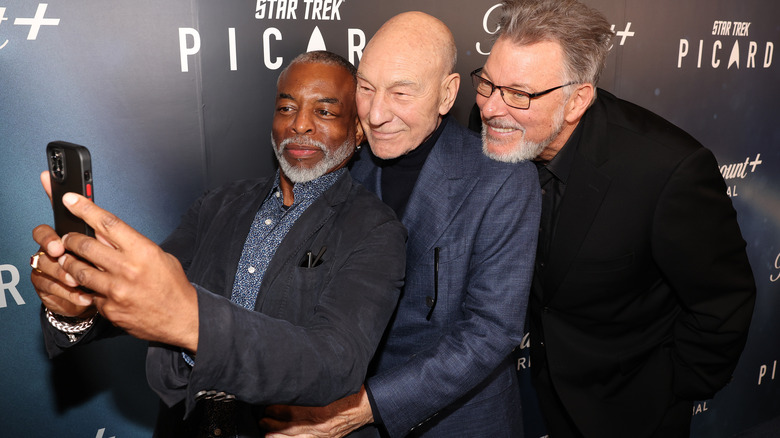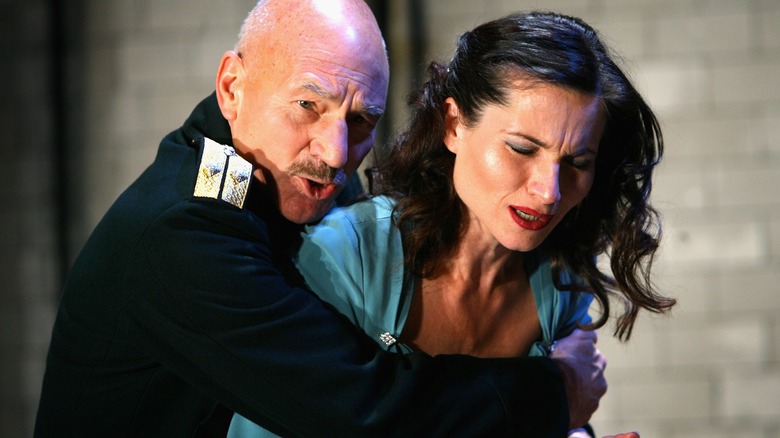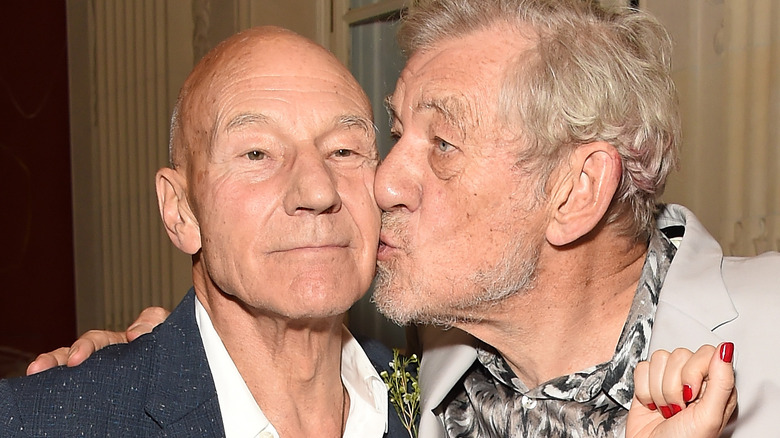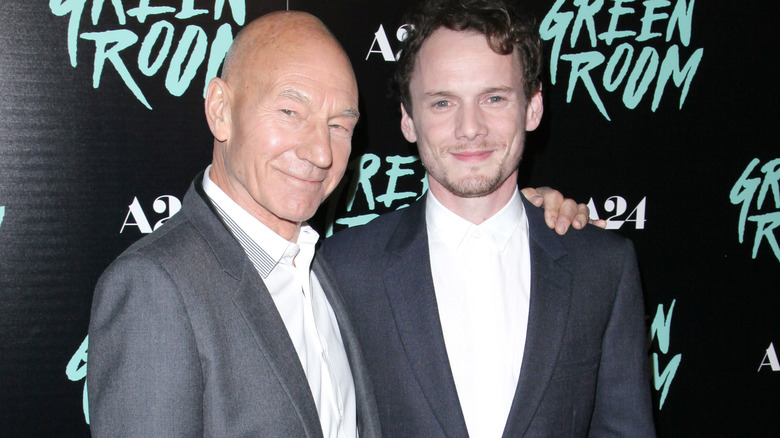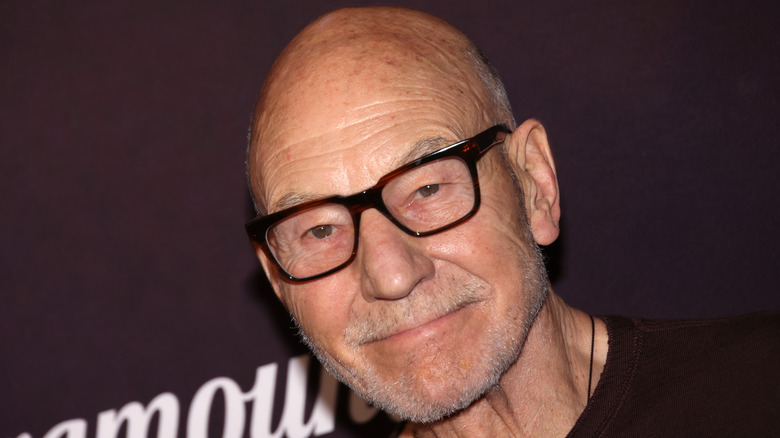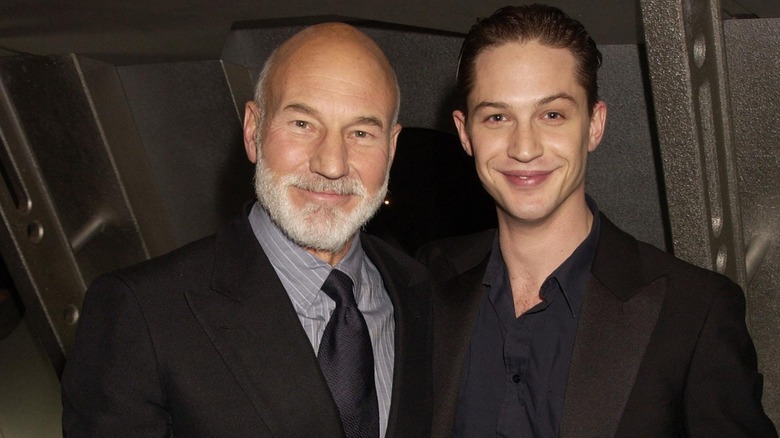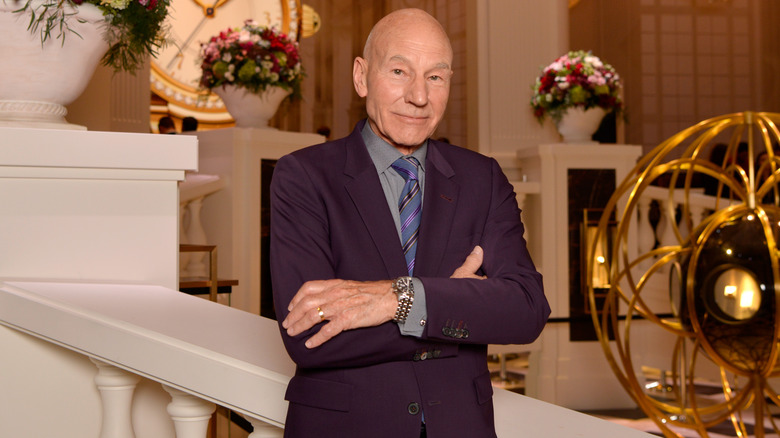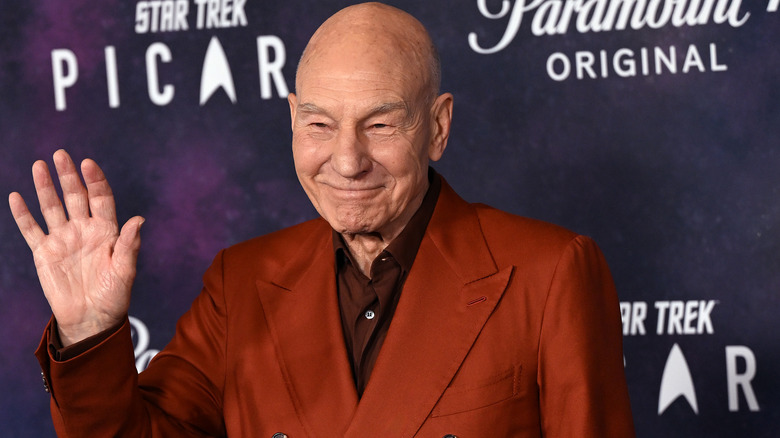19 Patrick Stewart Facts Only His Biggest Fans Know
Patrick Stewart isn't merely a national treasure; he's an international treasure — and that's what makes it hilarious when he doesn't seem to realize just how big he is. When he sat down to talk to The Guardian around the release of the second season of "Star Trek: Picard," he not only reminisced about how "the distinction between Jean-Luc Picard and Patrick Stewart became thinner and thinner, until it was impossible for me to know where he left off and I began," but he also recalled the first time he went to one of these things called a "convention."
Stewart started out by declining invitations, because he couldn't imagine anyone wanting to sit and listen to him talk. As "Star Trek: The Next Generation" was winding down for the season, Stewart agreed to appear at a convention in Denver, without entirely knowing what to expect. "They took me to the back of this big building and I said, 'What if no one turns up?' And they looked at me like I was talking gibberish."
There were thousands of people gathered there, of course, and Stewart described the atmosphere as one of smothering him with "an intense sense of affection and respect." It's no wonder, then, that he's described his time playing Picard — and later, Professor X — as having the biggest impact in a lifetime on the stage and screen. That said, there are still some fascinating tidbits even the biggest "Star Trek" fan might not know about this larger-than-life personality.
He learned the truth about his father's military service
"Who Do You Think You Are?" is a British television series where celebrities sit down with genealogists, researchers, and historians to learn some of the long-buried secrets in their family's past, and it's honestly one of the most fascinating pieces of real-life celebrity television around. When Patrick Stewart appeared on the show in 2012, he shared and learned a lot about the father he'd had a shockingly difficult relationship with.
After sharing the fact that his older brother, Geoffrey, was born out of wedlock and that family lore suggested his father had enlisted in the army to get away from responsibilities, Stewart was presented with records that confirmed Alfred Stewart had enlisted two weeks after his brother's birth. "Perhaps the actor in me is inclined to see that as a dramatic and perhaps desperate gesture," Stewart observed with a clearly long-held sadness.
He also learned that his father was a member of the regimental police, which made absolute sense to him. They were powerful, feared, intimidating, and wildly feared: "All of that merges with a picture that I, by firsthand experience, am very familiar with," Stewart said. After leaving the service and marrying Stewart's mother, Alfred was recalled to service during World War II. He was part of a battalion sent to France ahead of Germany's invasion of the country, and was responsible for building infrastructure — particularly railways — that was essential for the Allied supply chain.
He didn't meet his father until he was five years old
Patrick Stewart grew up in a small house in Yorkshire, and was born about the same time his father was sent off to overseas service in World War II. In a segment of "Who Do You Think You Are?" he shared that he didn't get to know his father until he was five years old. The elder Alfred was fresh off the battlefield, and it not only wasn't a pleasant experience, but life became completely different.
Stewart spoke of his life with his mother: "I think that I was indulged, and spoiled, and petted, and loved during those five years. All of that changed dramatically when this man appeared in the house." He's been candid about the fact that while he can't remember his father ever hitting him, he was incredibly violent to his mother... and he recalled never really understanding why.
Stewart once wrote for The Guardian: "A fellow soldier once told me, 'When your father marches on to the parade ground, the birds in the trees stop singing,'" and what he learned on "Who Do You Think You Are?" allowed him to make some sense of things. A newspaper clipping revealed that his father's war service — which included staying behind on the beaches of Dunkirk and being among the last evacuated from the beach before the fall of Cherbourg — had left him suffering from what was called shell shock at the time. Stewart said that suddenly, pieces fell into place.
The work he does with domestic violence charities is deeply personal
In 2018, Patrick Stewart appeared at a panel discussion alongside Luke and Ryan Hart. The panel — hosted by a charity called Refuge — addressed domestic violence, and it was deeply personal: The Hart brothers' father had shot and killed their mother and sister before dying by suicide himself, and Stewart has written about growing up petrified of his father... some of the time.
In a piece for The Guardian, Stewart shared that during the week, his father was a hardworking and charming storyteller, but after coming home from the pubs on the weekend, it was a different story. He wrote that he would listen for the sound of singing as he came down the street. "Certain songs were reassuring," he wrote. "... But army songs were not a good sign. And worst of all was silence. When I could only hear footsteps it was the signal to be super-alert."
What inevitably unfolded was terrifying violence that occasionally ended only when an ambulance or law enforcement was called. Even then, Stewart said that police who responded would often tell the family that clearly, she had done something wrong, something to deserve being hit. "No one came to help. No adult stepped in and took charge. I needed someone else to take over and tell me everything was going to be all right and that it wasn't my fault. I wanted the anger to go away and, when it stayed, I felt responsible."
He's been candid about the benefits and fears that go with therapy
Patrick Stewart has been open about the violence that he grew up witnessing: It was so bad that when his mother died before his father, Stewart recalled his brother suggesting that maybe her death had been his fault. Fast forward to 2023, and Stewart told The Guardian: "I wish so, so much to be able to sit down with him. To say, 'OK, I'm 82 now, you're 100 and whatever, let's talk.'" And that's only come, he says, after decades of therapy.
In an interview with The Telegraph, Stewart admitted that there was always a fear that the potential for violence he saw in his father existed in him, too. A reminder of that had been sitting on his desk for decades: It was a photo of him playing Leontes in "A Winter's Tale," circa 1981. He explained that he'd initially turned down the role because it required a performance of anger that he hadn't felt able to face.
Stewart was 80 at the time of that interview and said that he was still seeing a therapist on a weekly basis and was still looking for answers to the violence that defined his childhood. He's acknowledged that it wasn't easy, telling Gentleman's Journal that when he first thought about therapy, he worried that he'd lose whatever it was that gave him his acting ability. "But of course, as all actors have found out, it actually opens more doors to new demons."
The moment he knew he was home
Sometimes, processing trauma means using the tools that are available at the moment, and for a long time, Patrick Stewart used acting and theater as his way of dealing with what had happened around him as a child. He told The Guardian that it was an escape from the very real, very awful world at home. He recalled the first time he read for "The Merchant of Venice," saying, "I couldn't even pronounce some of the words. [But] I escaped. And my dream became more of a dream. Not just of having a different life. But, for the few minutes I had on stage, actually living it."
Stewart told The Yorkshire Post that he famously credits English teacher Cecil Dormand with discovering his talents as a young actor, but even before he came into his own as an actor, he knew that the stage was where he belonged.
He was fresh out of drama school when he got a job as an assistant stage manager in the Lincoln Repertory Theatre, and in his memoir, "Making It So" (via NPR), he wrote a passage about how meaningful it was. He wrote of always being the last one to leave the theater every night, of leaving a single light on over the stage — per tradition — and added, "I was part of all this now. Indeed, I had responsibilities to fulfill, even if they were as a lowly assistant stage manager. This, I thought, is now my home."
The fine line between real anger and acting
Patrick Stewart has been incredibly candid about the abuse that he saw his mother suffer at the hands of his father, and told The Telegraph that it wasn't just the violence he needed to come to terms with: "To know that you were surrounded by people who were aware of the horror stayed with me, and that's why I never talked about it."
He says that it continued only until he was old enough — and physically imposing enough — to put an end to it himself... at least, while he was in the house. After spending some of his time at school training as a boxer, he said, "I warned him that if he did anything to her, he would come off worse. He took that message on board. For him to have a son stand up to him in that way created complex feelings. He just became too old to be a warrior." He's been candid, too, about fearing that the same anger that was in his father was in him, too.
He's used that, tapping into both his father's toughness and his mother's kindness for one of his most famous roles. An interview with Wired quoted a passage from his memoir: "I drew Picard's stern, intimidating tendencies [from his father]. But I like to think that my mother is in the captain too, in his moments of warmth and sensitivity."
He faced a massive learning curve when he started on Star Trek: TNG
Surely, the hardest part about acting is, well, acting... right? Not necessarily, and according to what Patrick Stewart wrote in his memoir, "Making It So" (via The Hollywood Reporter), going from the stage to a television set was just an adjustment that it took an intervention from some of his castmates to get everyone on the same page.
Outtake-worthy mistakes and missteps didn't just get on his nerves, but they offended his proper theater training — where, after all, performances were live, there were no reshoots, and you'd better get it right every time. "On the TNG set, I grew angry with the conduct of my peers, and that's when I called that meeting in which I lectured the cast for goofing off and responded to Denise Crosby's, 'We've got to have some fun sometimes, Patrick,' comment by saying, 'We are not here, Denise, to have fun.'" And it could have been the end right there, as everyone else found it absolutely hilarious... except, of course, for Stewart, who stormed out.
It took Jonathan Frakes and Brent Spiner pulling him aside to get him on board with the television-show-set mentality, reminding him that they weren't on a London stage. In addition to having a different culture in the day-to-day, they gently told him that he wasn't making any friends by going all King Lear on them... and Stewart admitted, "I had failed to read the room."
On going bald early
Many people rock the bald look by choice, but according to what Patrick Stewart wrote in his memoir, "Making It So" (via Insider), one of his most distinctive features wasn't his choice. When he was 17 years old, he said that his dark, thick hair had started to thin, and he soon realized that he had the overwhelming urge to stop by the hair loss clinic he walked by on a regular basis.
He raised the money by working as a bricklayer for three weeks, went to the clinic, and found it didn't do any good. Completely bald on top by 19, he went for the combover look... until some older and wiser friends taught him a very important lesson. He was on the BBC talk show "Parkinson" when he shared that a friend from drama school had invited him over for lunch. A meal and a bottle of wine later, the friend — who was a black belt in judo — pinned his arms behind his back while his wife cut off the comb-over. When it was over, he told Stewart: "Now, you be yourself. No more hiding."
Stewart also shared a touching story about Gene Roddenberry addressing Picard's baldness. When asked to explain why a futuristic starship captain would be bald when that had surely been cured by then, Stewart said, "And Gene Roddenberry said, 'No, by the 24th century, no one will care.'" Stewart continued, "It's one of the nicest things that's ever been said about men like me."
He completely changed the way he speaks
All celebrities have recognizable voices to some extent, but Patrick Stewart's voice is just iconic — and let's be honest, it makes "American Dad" just that much better. But it turns out that Stewart's stage voice and real voice have next to nothing in common, and according to what he told The Irish Times, that's the result of a lot of work.
"I didn't just have an accent," he said. "I spoke Yorkshire dialect. If I was going to a friend's house I'd say: 'Is thoo cimun' oot tee lark?' That is: 'Are you coming out to play?' It's dialect." He explained a little more in an interview with Wired, saying that while an accent with different inflections, a dialect is different words altogether — and when he shifts back into his native tongue, as it were, well... subtitles were needed.
Stewart says that from the age of 12, he worked to not entirely get rid of the Yorkshire influence, but at least be able to hide it very, very well. He attended acting and pronunciation classes (along with the oftentimes surreal Brian Blessed), and said, "I had to be careful not to mix it up. I'd be hit over the head if I spoke upper class with my friends." And he says the Yorkshire dialect is still natural for him: When he speaks to friends and family back home, it's Yorkshire all day long. "My wife says that I almost immediately become incomprehensible!"
He's a firm believer in the paranormal
Being in the theater brings a certain amount of superstition with it — just look at the strict observance of the play-that-must-not-be-named. But belief in the paranormal? According to Patrick Stewart, absolutely. In a Sky Arts documentary (via The Telegraph), Stewart and longtime BFF Ian McKellen were talking about an incident that happened during a performance of their "Waiting for Godot." They recalled a show where McKellen needed to ask the always-professional Stewart what had happened to throw him off his game, and he explained: "I just saw a ghost. On stage, during Act One."
It wasn't just any ghost, either, and they believe Stewart saw the apparition of John Baldwin Buckstone. In addition to being a good friend of Charles Dickens, he was also the theater manager and the person who came up with the idea of early shows, or matinees.
Stewart has had ghostly experiences off the stage, too. In his memoir, "Making It So" (via The Hollywood Reporter), he recalls buying an already-inhabited home in Los Angeles. "Yes, it was haunted," he wrote. "There was no question about that. There were phenomena present in that house that could not be explained and that I experienced and were experienced by others." He went on to describe hearing footsteps and voices in empty rooms, strange changes in temperature, and even books flying off their shelves. What's it like living in a haunted house? "It had become bothersome," he wrote.
What's the real story behind that viral pizza photo?
Patrick Stewart was 72 years old when he tweeted a photo that went viral for the simple fact that it seemed so very unlikely. He was eating a slice of pizza and looking a little under the weather and worse-for-wear in the photo, which he captioned, "My first ever pizza 'slice.'" That's about where the world went, 'Wait, what?!"
Media outlets were shocked that he apparently had never had pizza before, and the New York Intelligencer got in touch with him to set the record straight. He thought it was hilarious, and clarified: "People misunderstood. There was a school of thought that I had eaten my first pizza, but of course, how could that possibly be true? I would have had to have stayed locked up in a cellar. But nevertheless, this was my first 'slice' of pizza, which I was only eating because my fiancée and I were a little hung-over yesterday morning..."
He did, however, admit that he had initially tried the knife-and-fork method before learning very quickly that it was absolutely wrong. He also admitted that when he was growing up, he hadn't been exposed to pizza much. It was such a delicacy, in fact, that he hadn't entirely understood the words of Dean Martin's "That's Amore," and had grown up thinking he was singing about "A piece of pie." "I was actually in my twenties before I saw a pizza," he admitted.
His biggest regret
It's a sad fact of life that no one gets through it without some regrets, and that applies to Patrick Stewart, too. In 2023, he'd just finished penning a retrospective of his life with his memoir, "Making It So," and when he sat down to talk to CBS, he admitted his biggest regrets were his failed marriages. (His first was on the rocks when it ended for good following his affair with "Star Trek" costar Jennifer Hetrick, and at the end of the second — to Wendy Neuss — came when he hooked up with the much younger actress, Lisa Dillion.)
The end of his first marriage did some serious damage to his relationship with his children, and when he spoke about his children — from his first marriage — to The Guardian, it's rough stuff. "It's very sad. I love my children. But our relationships, they haven't worked out." They had difficulty in dealing with his affair, he said, and called it "a work in progress."
And as far as his professional career, there are regrets there, too. He told The Hollywood Reporter that while he was grateful for the emotional depth he was allowed to find in "Star Trek: Picard," he said, "My only regret is that once Jean-Luc revealed those hidden facts about his childhood to us, I almost wished we could immediately put him back on the bridge of the Enterprise to hear and see what the impact this revelation had on him. But we couldn't do that."
It's a surprising role that had the most profound impact on him
Patrick Stewart has done precisely one audiobook: His own memoir. According to what he told The New York Times, "It was my first, and I suspect last, audiobook." He called it exhausting, but when they asked what roles had impacted him more deeply than others, he had something of a surprising response and cited his year-long stretch of playing Macbeth.
"The role got into me so deeply it dominated my life at the time and caused me to drink too much alcohol after the performance was over. No other role I have played has affected me so profoundly."
He went into more detail with The Guardian, saying that the 2007-2008 run was so exhausting that "performing that play took everything I had." He said that not only was he drinking too much, but that he would pass out, wake up completely hungover, and have to psych himself up for the fact that he was going to be needed back on stage that night. It was an eye-opening experience, he added, saying that it was the moment that he realized, "Everything has to count; it's not just fun anymore."
One of the biggest compliments he gets
In 2023, Patrick Stewart had a conversation with Wired that touched on sexuality. He explained that being in the theater, he had always been around members of the LGBTQ+ community, saying, "I adored these people, and when we arrived in Sydney, I moved into a house with three gay men. And their kindness, generosity, humor, and commitment to their work so impressed me that I fell in love with them. I fell in love with the man who married Sunny and me, Ian McKellen." In addressing the interviewer saying he'd always thought Stewart was gay, he responded, "I take in your assessment of my sexuality with gratitude, and a certain amount of pride."
He's also spoken to Advocate on the topic, saying that the idea of supporting the community was always a little odd to him, because "It was always a natural and uncomplicated choice." It was after his friendship with McKellen solidified that he said he was happy to join parades and show support — which makes it strange that he was caught up in some major backlash about one particular stance.
In 2015, he appeared on BBC Newsnight to address the issue of a bakery in Northern Ireland that had refused to make a wedding cake for a gay couple, citing their beliefs. Stewart was on the side of the bakery: Why? Because they found the requested inscription offensive, and Stewart said that everyone had the right to their beliefs.
His character in Green Room tapped into a terrifying real-life encounter
In an interview with BuzzFeed, Stewart shared that there were two things going on behind his decision to take the part of the white supremacist gang leader in "Green Room," and it started with one of his deepest fears. "I think most of my life, ... what I used to be afraid of was being in a situation where there would be other individuals who I would identify as dangerous with whom I couldn't reason," he shared.
In the movie Stewart is, of course, the individual who can't be reasoned with, and although he initially denied ever having been in a situation like that, but then recalled an encounter he had as a 20-something in England.
He'd become friendly with a local writer with a troubled past, someone he described as having "a tendency to violence." He had, in fact, done jail time for "grievous bodily harm," and Stewart saw that tendency up close and personal. They were out drinking one night when the man cornered him in the bathroom and pulled a knife. "I didn't recognize him. His face was changed. ... I felt certain that something really bad was going to happen, and that he meant me harm." Stewart was able to talk him out of using the knife and said that while he didn't cut ties with the man, he was very, very careful around him.
He's been actively campaigning for assisted dying in the U.K.
In 2019, Patrick Stewart appeared on This Morning to talk about a cause that had become heartbreakingly close to him: Legalizing assisted dying, which is essentially the right of a person with a terminal illness to choose to end their own life. Stewart became involved in the movement to introduce legislation that would legalize the procedure after a close friend went through a terrible ordeal.
He told the story of an unnamed friend whose wife was diagnosed with terminal cancer and living in constant, unbearable pain. After attempting an overdose with pills, she was hospitalized and returned home. Stewart shared that she had asked her husband to go take their dog for a walk, and when he returned, he discovered that she had asked him to leave so that she might die by suicide. He described it: "A traumatic, painful, miserable way to die, and a traumatic way for your husband to discover that is how you died."
Since then, Stewart has become a supporter of the U.K. organization Dignity in Dying, saying that it should be a basic human right to choose to die when faced with a terminal diagnosis. He summed his views up via the Independent, saying, "Dying people should not be forced to take drastic measures, traveling to another country to take their own life. They should have the choice to die at home on their own terms."
Not a bad word to say about anyone. Except...
Everyone loves Patrick Stewart, right? Right. So, is there anyone that he doesn't get along with? Kind of. For starters, he talks about the poor, much-maligned Wesley Crusher, saying in his memoir (via The Hollywood Reporter) that he was a little uncomfortable with a character he called "a little gimmicky." He says, too, that he only realized much later that he hadn't particularly gotten along with Wil Wheaton because of jealousy: "In those first weeks, I wished I had Wil's confidence," he wrote.
Jump over to "Star Trek: Nemesis," and Stewart wrote that he wasn't really a fan of the movie, and he wasn't a fan of Tom Hardy's, either. He wrote (via Insider) that Hardy was "an odd, solitary young man from London," adding, "Tom wouldn't engage with any of us on a social level. Never said, 'Good morning,' never said 'Goodnight,' and spent the hours he wasn't needed on set in his trailer with his girlfriend."
Stewart says that he was happy to see his prediction that Hardy would never be cast in anything again was wrong, but according to what he told The Guardian, it seems as though his bitterness toward Gregory Peck is a little more long-lasting. When asked about his biggest disappointment, he said that it was when his performance as Captain Ahab in "Moby Dick" wasn't acknowledged by Peck in his Golden Globes speech. Peck won for Best Supporting Actor, and Stewart still felt the snub years later.
He finds solace in art
In 2017, Scottish artist Frank To spoke with the BBC about an experience that had to be a little out-of-body: The year before, Patrick Stewart had reached out to him and asked him to be his one-on-one art teacher. It wasn't completely out of the blue, and he says that he was an alumnus of Huddersfield, Stewart was the vice chancellor, and as a lifelong appreciator of fine art, Stewart attended his degree show in Glasgow.
About a year went by before Stewart approached him about art lessons, and he explained, "When we first met, Patrick had just had a heart operation and I had gone from degree, to masters, to unemployment. It was a strange and confusing time for us both, but we discovered we had so much in common." Stewart, meanwhile, apparently used some of his lessons: "I think he may have had a say in the new "Logan" movie, because I recognize the color schemes in scenes, and even in what he's wearing."
Stewart has always been fascinated by art, and in an interview with the Radio Times, he shared the utterly charming fact that his love has led him to a particular hobby: Jigsaw puzzles. He said that no matter where he is, he's usually in the middle of working on one, and often, it's a photo of a fine art piece. What's the attraction? "It truly makes you look at the painting and its detail, it teaches you a lot."
On dealing with pain and bad memories
When his memoir finally hit shelves in 2023, Patrick Stewart was pretty honest not only in the book's pages but when it came time to talk to the Associated Press about how difficult it had been. He recalled how surprisingly easy it had been to go back through the years, and said that it had been surprisingly therapeutic — but even though he said that the process of writing had brought him "some of the happiest days of my life," he acknowledges that there were tears, too.
And that's not entirely surprising, especially considering that a large part of his memoir dealt with the childhood trauma that he's still trying to come to terms with. But he's also shared (via Gentleman's Journal) how he's tried to make sure that he learns something from every one of life's experiences, even the painful ones. And honestly? It's kind of a great perspective.
"Because there's this thing called 'sense memory," he shared, and his example was the incredibly painful procedure of getting several shots to treat his arthritis. "I kept saying to myself: 'Remember what pain like this feels like — what does it do to you, what's happened to your breathing, what's happened to your skin;' ... No experience is a waste of time."
